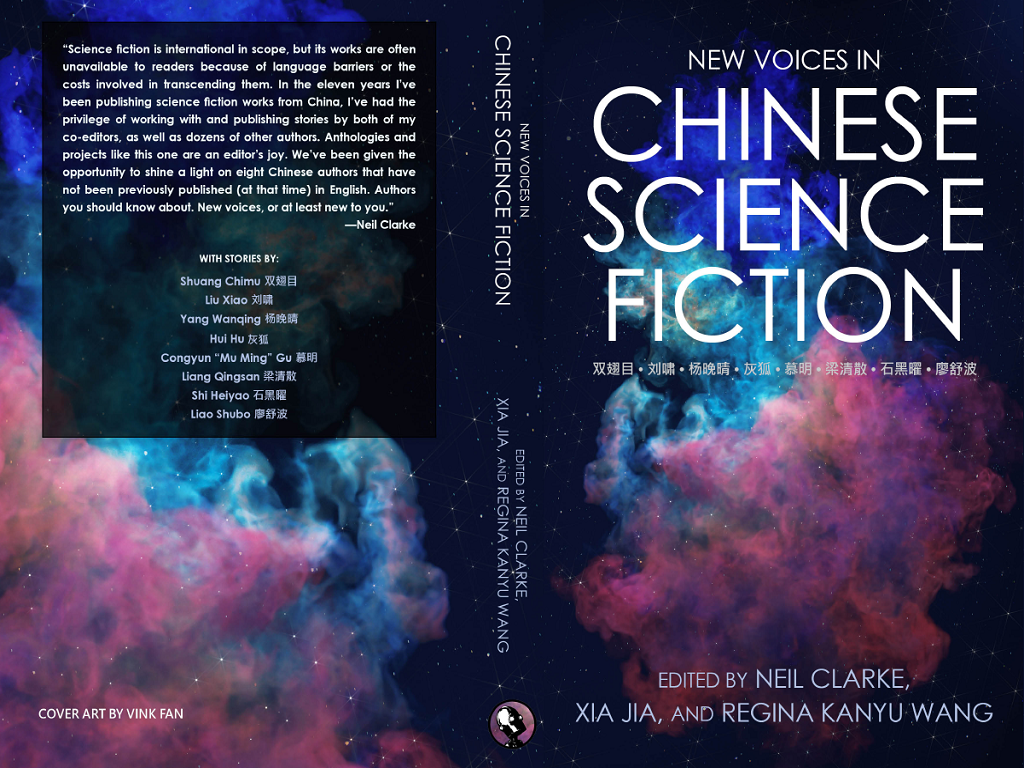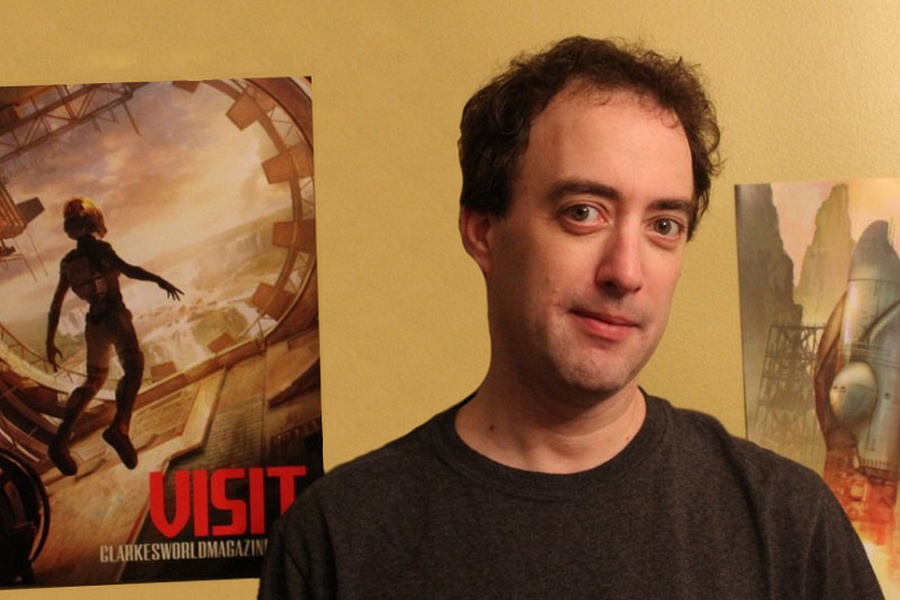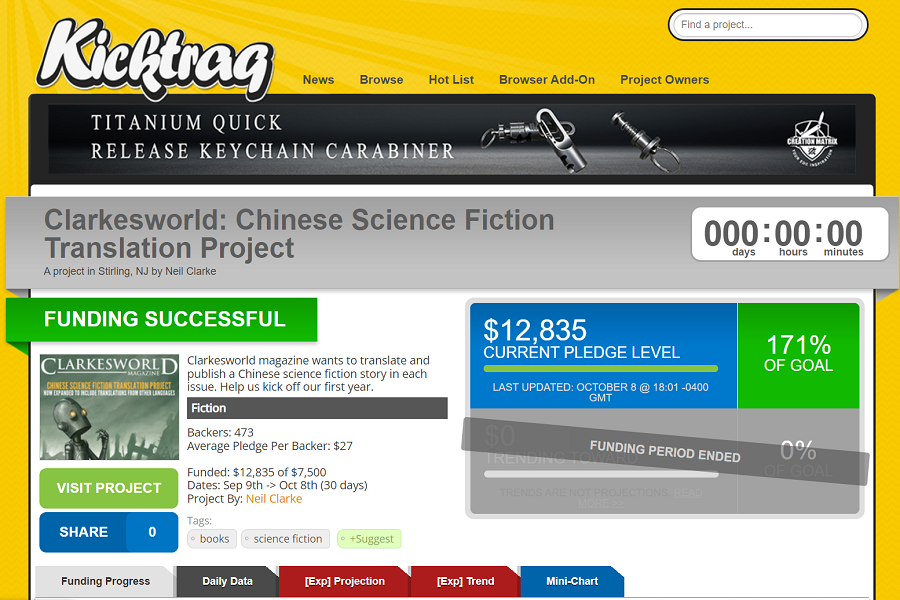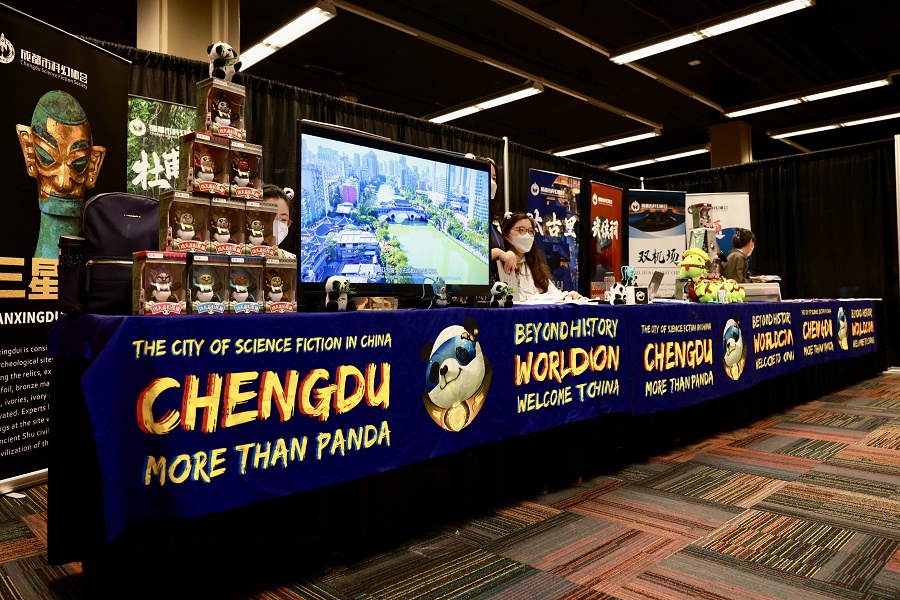Together for a Sci-Fi-Inspired Future

Ding! An email dropped into Neil Clarke’s inbox on a seemingly normal day in April 2014. It was an out-of-the-blue invitation from Storycom International Culture Communication Co., Ltd., a Chinese story commercialization agency focusing on the sci-fi genre, to partner on the Chinese Science Fiction Translation Project. It “seemed too good to be true” to the award-winning editor-in-chief of the New Jersey-based Clarkesworld, a monthly sci-fi and fantasy magazine launched in October 2006.
Although foreign sci-fi works began to be translated into Chinese as early as 1900 starting with Jules Verne’s Around the World in Eighty Days (translated by Chen Shoupeng and Xue Shaohui), Chinese sci-fi literature wasn’t translated into other languages until decades later.
Clarkesworld began engaging with Chinese sci-fi publication in 2011 when Ken Liu, a Chinese-American sci-fi writer, editor, translator, and Hugo Award winner, submitted an English translation of Chen Qiufan’s The Fish of Lijiang, which became the first Chinese sci-fi novel published in Clarkesworld. Liu’s second translation followed just a year later—Xia Jia’s A Hundred Ghosts Parade Tonight.
“Clarkesworld has always tried to cast a wide net in its search for sci-fi stories from other parts of the world since different perspectives make the genre stronger,” said Clarke, explaining how their efforts attracted interest from Storycom to jointly lift the sci-fi genre to the next level. Under the Shimmer Program, one of its nonprofit projects, Storycom supports translation of Chinese science fiction into other languages.

A portrait of Neil Clarke with the backdrop of covers of Clarkesworld, a Hugo Award-winning sci-fi magazine. (Photo courtesy of Neil Clarke)
Cross-Border Partnership
“Why isn’t there a Chinese sci-fi story this month?” smirked Clarke, mimicking reader feedback. “Are you still working with Storycom? Please tell me you haven’t stopped doing this!” If a translation took too long, the magazine’s readers would submit “complaints,” evidencing the popularity of the initiative.
Clarkesworld signed an agreement with Storycom in September 2014 to add a translated Chinese sci-fi story to each issue of the magazine. Subsequently, it launched the kickstarter campaign to raise funds for the inaugural year of the Chinese Science Fiction Translation Project: three stories in the first six months—the ramp-up period—and another six stories in the following six months. The kickstarter campaign finally received US$12,835 from 473 people, exceeding the goal of raising US$7,500-12,500. It financed the necessary head start to make the project self-sustaining through subscriptions and other monetization methods such as advertising, ebooks, anthologies, and Patreon.

A screenshot of the 2014 kickstarter campaign to raise funds for the Chinese Science Fiction Translation Project.
Storycom has arranged an all-star team of Chinese sci-fi professionals led by Liu Cixin, winner of the 2015 Hugo Award for The Three-Body Problem, and Yao Haijun, editor-in-chief of Science Fiction World, a Chinese sci-fi monthly founded in 1979. Every month since 2015, they recommend a list of stories that might work well for Clarkesworld, and then Clarke selects one and works with the author and translator to prepare the story for publication. Every story appears in all editions of Clarkesworld including its free online edition, podcast (audio fiction), ebook and digital subscriptions, print issues, and annual anthologies. In 2017, Touchable Unreality, the first Chinese-English bilingual anthology of contemporary Chinese sci-fi works, was published by China Machine Press as a phased summary of the partnership between Clarkesworld and Storycom. The compendium incorporated nine works including Security Check by Han Song, Preserve Her Memory by Bao Shu, If on a Winter’s Night a Traveler by Xia Jia, and Yuan Yuan’s Bubbles by Liu Cixin.
It should be noted that unlike his competitors who tend to publish foreign works together, Clarke prefers a sandwich model as a more effective way to indicate that translations are as good as anything else they print. “When a magazine does a special issue themed on works of the same origin, it sometimes comes across like lowering the bar, implying those normally are not part of this community but this time the stage will be shared for a little bit,” he explained. “But mixing up stories by authors from a wide variety of countries is pretty much a standard practice for us—it’s part of our identity to be welcome to everybody in the world.”
After publishing translations in Clarkesworld for over five years, Clarke and his team launched Clarkesworld Books in 2019, a new dedicated taskforce aiming to publish quality sci-fi translations with special emphasis on short stories in collections, anthologies, and standalone novellas. “Magazines tend to have a more general purpose while imprints are more theme-oriented with a different marketing focus,” Clarke said, explaining his logic of building on previous successes.
A Summer Beyond Your Reach: Stories by Xia Jia (2021), the debut work of Clarkesworld Books and the first crowd-funded Chinese-to-English sci-fi book, was published in August 2021 thanks to joint efforts with Storycom. New Voices in Chinese Science Fiction followed soon thereafter. Published in July 2022, the anthology featured previously untranslated sci-fi writers from China. Highlights included My Family and Other Evolving Animals by Shuang Chimu, The Bridge by Liu Xiao, and Tombstone by Yang Wanqing.
Universal Charm
“What makes Chinese science fiction Chinese?” That’s the million-dollar question arising from the global boom of Chinese sci-fi works and one Clarke has been asked countless times, to which he retorts “there’s no answer to that.”
As per Clarke, one initial goal of the cooperation project with Storycom was to “make translation normal.” “Most of our readers tend to see a translated Chinese sci-fi work just as another story in our magazine,” he said. “They generally just show affection by mentioning the author’s name rather than anything about translation.” Also, Clarke is aware that their collection of translated Chinese sci-fi works offers readers only a “thin slice” of the whole sci-fi landscape in China. “Science fiction is like a big umbrella covering a very wide range. We’ve published a lot of different Chinese authors but are still only scratching the surface.”
Emily Xueni Jin, an academic researcher and translator of Chinese science fiction, echoed Clarke’s opinion. In The Questionable “Chinese-ness” of Chinese Sci-Fi, she suggested that Chinese science fiction be a wealth of possibility rather than a label. Perhaps the Chinese sci-fi label could be good marketing, but it limits a genre that should be limitless.
Some Chinese writers are veering away from the sci-fi pigeonhole by actively returning to Chinese traditions such as the classics and mythology and re-imagining them in a modern scenario, a strategy exemplified by The Way Spring Arrives and Other Stories (2022), a collection of Chinese sci-fi and fantasy works from a visionary team of female and nonbinary creators. Others create around personal experiences to minimize the need to highlight any Chinese-ness explicitly. Tongtong’s Summer by Xia Jia, included in the anthology A Summer Beyond Your Reach: Stories by Xia Jia, for example, is a sweet story about a young girl spending the summer with her ailing grandfather and a helper robot through virtual reality.
“While every author has his or her own cultural and literary influences, we appear to share very similar hopes, dreams and fears,” Clarke said. “Sure, characters and settings may have different names, but at hearts, the stories transcend.”

A booth is set up at the 2022 Worldcon in Chicago of the United States to showcase Chengdu Worldcon 2023 preparations and the Chinese city’s history and culture. (Photo courtesy of Chengdu Science Fiction Society)
The 81st World Science Fiction Convention (Worldcon) will be held in Chengdu, southwestern China’s Sichuan Province, from October 18 to 22 this year. Clarke proclaimed that “there needs to be a Worldcon in China” after his visit to attend the Fourth China International Science Fiction Conference in November 2017. The visit was inspiring, and he returned home thinking “it’s a young and energetic community that has much to offer.” In 2016, China’s State Council announced a four-year plan to promote scientific literacy among its citizens including explicit instructions to increase the production of sci-fi works. Chinese sci-fi writers have been encouraged to inspire teenagers with quality works.
“I do think it will be very good timing for American sci-fi fans to go to the 81st Worldcon,” Clarke beamed. “They can witness how China has engaged a younger community, touch the contagious enthusiasm, and maybe learn something to re-engage in America.”
“Communication will help break the pedestal of the English language market and contribute to a more global sci-fi community to inspire the future,” he added.